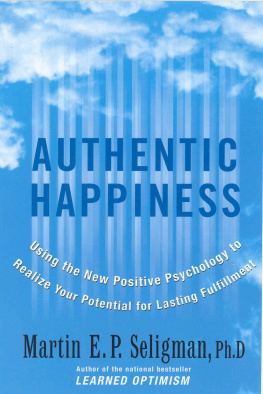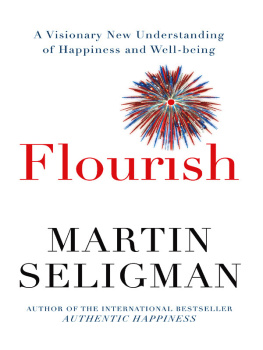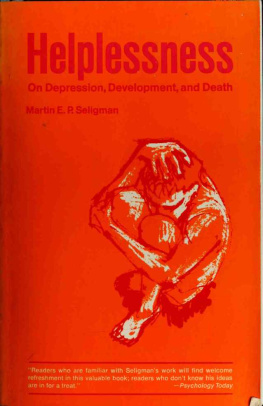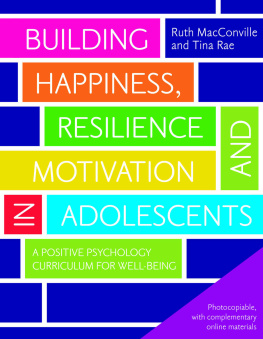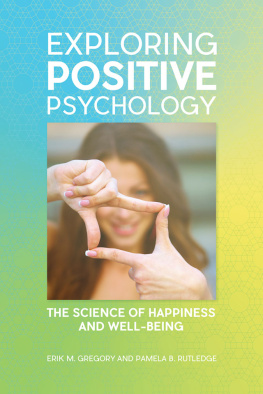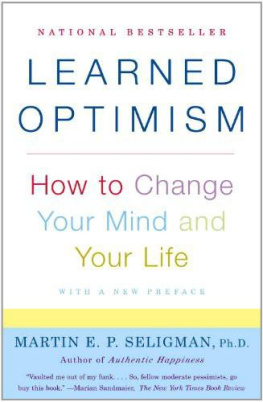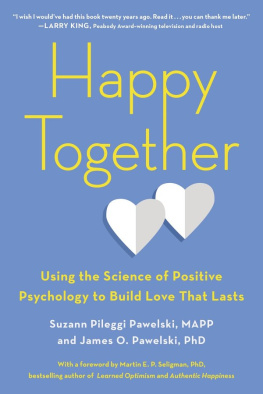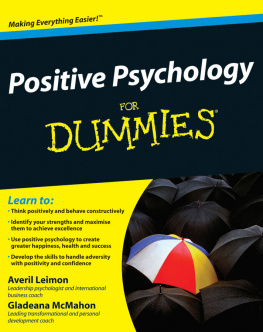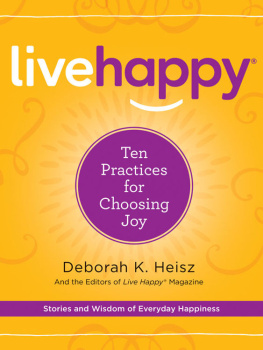Martin E. P. Seligman - Authentic Happiness: Using the New Positive Psychology to Realize Your Potential for Lasting Fulfillment
Here you can read online Martin E. P. Seligman - Authentic Happiness: Using the New Positive Psychology to Realize Your Potential for Lasting Fulfillment full text of the book (entire story) in english for free. Download pdf and epub, get meaning, cover and reviews about this ebook. year: 2002, publisher: Free Press, genre: Romance novel. Description of the work, (preface) as well as reviews are available. Best literature library LitArk.com created for fans of good reading and offers a wide selection of genres:
Romance novel
Science fiction
Adventure
Detective
Science
History
Home and family
Prose
Art
Politics
Computer
Non-fiction
Religion
Business
Children
Humor
Choose a favorite category and find really read worthwhile books. Enjoy immersion in the world of imagination, feel the emotions of the characters or learn something new for yourself, make an fascinating discovery.
- Book:Authentic Happiness: Using the New Positive Psychology to Realize Your Potential for Lasting Fulfillment
- Author:
- Publisher:Free Press
- Genre:
- Year:2002
- Rating:3 / 5
- Favourites:Add to favourites
- Your mark:
- 60
- 1
- 2
- 3
- 4
- 5
Authentic Happiness: Using the New Positive Psychology to Realize Your Potential for Lasting Fulfillment: summary, description and annotation
We offer to read an annotation, description, summary or preface (depends on what the author of the book "Authentic Happiness: Using the New Positive Psychology to Realize Your Potential for Lasting Fulfillment" wrote himself). If you haven't found the necessary information about the book — write in the comments, we will try to find it.
Martin E. P. Seligman: author's other books
Who wrote Authentic Happiness: Using the New Positive Psychology to Realize Your Potential for Lasting Fulfillment? Find out the surname, the name of the author of the book and a list of all author's works by series.
Authentic Happiness: Using the New Positive Psychology to Realize Your Potential for Lasting Fulfillment — read online for free the complete book (whole text) full work
Below is the text of the book, divided by pages. System saving the place of the last page read, allows you to conveniently read the book "Authentic Happiness: Using the New Positive Psychology to Realize Your Potential for Lasting Fulfillment" online for free, without having to search again every time where you left off. Put a bookmark, and you can go to the page where you finished reading at any time.
Font size:
Interval:
Bookmark:

Other Books by Martin E.P. Seligman
Helplessness
Learned Optimism
What You Can Change and What You Cant
The Optimistic Child

THE FREE PRESS
A Division of Simon & Schuster, Inc.
1230 Avenue of the Americas
New York, NY 10020
Copyright 2002 by Martin Seligman
All rights reserved, including the right of reproduction in whole or in part in any form.
THE FREE PRESS and colophon are trademarks of Simon & Schuster, Inc.
Designed by Karolina Harris
Library of Congress Cataloging-in-Publication Data
Seligman, Martin E. P.
Authentic happiness : using the new positive psychology to realize your potential for lasting fulfillment/ Martin E. P. Seligman.
p. cm.
Includes bibliographical references and index.
1. Happiness. 2. Optimism. 3. Conduct of life. I. Title.
BF575.H27 S45 2002
158dc21
2002069288
ISBN-13: 978-0-7432-4788-7
ISBN-10: 0-7432-4788-4
Visit us on the World Wide Web:
http://www.SimonSays.com
This book is dedicated to my wife,
Mandy McCarthy Seligman,
whose love has made the second half of my life
happy and gratifying beyond my highest hopes.
T RANSCENDING
Escher got it right.
Men step down and yet rise up,
the hand is drawn by the hand it draws,
and a woman is poised
on her very own shoulders.
Without you and me this universe is simple,
run with the regularity of a prison.
Galaxies spin along stipulated arcs,
stars collapse at the specified hour,
crows u-turn south and monkeys rut on schedule.
But we, whom the cosmos shaped for a billion years
to fit this place, we know it failed.
For we can reshape,
reach an arm through the bars
and, Escher-like, pull ourselves out.
And while whales feeding on mackerel
are confined forever in the sea,
we climb the waves,
look down from clouds.
From Look Down from Clouds (Marvin Levine, 1997)
ContentsPreface
F OR the last half century psychology has been consumed with a single topic onlymental illnessand has done fairly well with it. Psychologists can now measure such once-fuzzy concepts as depression, schizophrenia, and alcoholism with considerable precision. We now know a good deal about how these troubles develop across the life span, and about their genetics, their biochemistry, and their psychological causes. Best of all we have learned how to relieve these disorders. By my last count, fourteen out of the several dozen major mental illnesses could be effectively treated (and two of them cured) with medication and specific forms of psychotherapy.
But this progress has come at a high cost. Relieving the states that make life miserable, it seems, has made building the states that make life worth living less of a priority. But people want more than just to correct their weaknesses. They want lives imbued with meaning, and not just to fidget until they die. Lying awake at night, you probably ponder, as I have, how to go from plus two to plus seven in your life, not just how to go from minus five to minus three and feel a little less miserable day by day. If you are such a person, you have probably found the field of psychology to be a puzzling disappointment. The time has finally arrived for a science that seeks to understand positive emotion, build strength and virtue, and provide guideposts for finding what Aristotle called the good life.
The pursuit of happiness is enshrined in the Declaration of Independence as a right of all Americans, as well as on the self-improvement shelves of every American bookstore. Yet the scientific evidence makes it seem unlikely that you can change your level of happiness in any sustainable way. It suggests that we each have a fixed range for happiness, just as we do for weight. And just as dieters almost always regain the weight they lose, sad people dont become lastingly happy, and happy people dont become lastingly sad.
New research into happiness, though, demonstrates that it can be lastingly increased. And a new movement, Positive Psychology, shows how you can come to live in the upper reaches of your set range of happiness; the first half of this book is about understanding the positive emotions and increasing yours.
While the theory that happiness cannot be lastingly increased is one obstacle to scientific research on the subject, there is another, more profound obstacle: the belief that happiness (and even more generally, any positive human motivation) is inauthentic. I call this pervasive view about human nature, which recurs across many cultures, the rotten-to the-core dogma. If there is any doctrine this book seeks to overthrow, it is this one.
The doctrine of original sin is the oldest manifestation of the rotten-to-the-core dogma, but such thinking has not died out in our democratic, secular state. Freud dragged this doctrine into twentieth-century psychology, defining all of civilization (including modern morality, science, religion, and technological progress) as just an elaborate defense against basic conflicts over infantile sexuality and aggression. We repress these conflicts because of the unbearable anxiety they cause, and this anxiety is transmuted into the energy that generates civilization. So the reason I am sitting in front of my computer writing this prefacerather than running out to rape and killis that I am compensated, zipped up and successfully defending myself against underlying savage impulses. Freuds philosophy, as bizarre as it sounds when laid out so starkly, finds its way into daily psychological and psychiatric practice, wherein patients scour their past for the negative impulses and events that have formed their identities. Thus the competitiveness of Bill Gates is really his desire to outdo his father, and Princess Dianas opposition to land mines was merely the outcome of sublimating her murderous hate for Prince Charles and the other royals.
The rotten-to-the-core doctrine also pervades the understanding of human nature in the arts and social sciences. Just one example of thousands is No Ordinary Time, a gripping history of Franklin and Eleanor Roosevelt written by Doris Kearns Goodwin, one of the great living political scientists. Musing on the question of why Eleanor dedicated so much of her life to helping people who were black, poor, or disabled, Goodwin decides that it was to compensate for her mothers narcissism and her fathers alcoholism. Nowhere does Goodwin consider the possibility that deep down, Eleanor Roosevelt was pursuing virtue. Motivations like exercising fairness or pursuing duty are ruled out as fundamental; there must be some covert, negative motivation that underpins goodness if the analysis is to be academically respectable.
I cannot say this too strongly: In spite of the widespread acceptance of the rotten-to-the-core dogma in the religious and secular world, there is not a shred of evidence that strength and virtue are derived from negative motivation. I believe that evolution has favored both good and bad traits, and any number of adaptive roles in the world have selected for morality, cooperation, altruism, and goodness, just as any number have also selected for murder, theft, self-seeking, and terrorism. This dual-aspect premise is the cornerstone of the second half of this book. Authentic happiness comes from identifying and cultivating your most fundamental strengths and using them every day in work, love, play, and parenting.
Positive Psychology has three pillars: First is the study of positive emotion. Second is the study of the positive traits, foremost among them the strengths and virtues, but also the abilities such as intelligence and athleticism. Third is the study of the positive institutions, such as democracy, strong families, and free inquiry, that support the virtues, which in turn support the positive emotions. The positive emotions of confidence, hope, and trust, for example, serve us best not when life is easy, but when life is difficult. In times of trouble, understanding and shoring up the positive institutions, institutions like democracy, strong family, and free press, are of immediate importance. In times of trouble, understanding and building the strengths and virtuesamong them, valor, perspective, integrity, equity, loyaltymay become more urgent than in good times.
Next pageFont size:
Interval:
Bookmark:
Similar books «Authentic Happiness: Using the New Positive Psychology to Realize Your Potential for Lasting Fulfillment»
Look at similar books to Authentic Happiness: Using the New Positive Psychology to Realize Your Potential for Lasting Fulfillment. We have selected literature similar in name and meaning in the hope of providing readers with more options to find new, interesting, not yet read works.
Discussion, reviews of the book Authentic Happiness: Using the New Positive Psychology to Realize Your Potential for Lasting Fulfillment and just readers' own opinions. Leave your comments, write what you think about the work, its meaning or the main characters. Specify what exactly you liked and what you didn't like, and why you think so.

